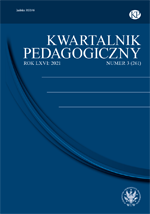Wiek rodziców a szkolne funkcjonowanie uczniów klasy szóstej
Parents’ age and school functioning of sixth-grade
students
Author(s): Roman Dolata, Barbara MurawskaSubject(s): Social Sciences, Education
Published by: Wydawnictwa Uniwersytetu Warszawskiego
Keywords: parental age; intelligence; school achievements; social functioning; sixth-grade students
Summary/Abstract: The article presents the results of empirical analyses of the relationship between the age ofparents and the school functioning of their children from 6th grade of primary school. Previousresearch does not provide a clear picture of this relationship. In the case of older parents,the results more often indicate a positive prediction of school achievement, while the youngage of parents rather increases the risk of problems. The analyses used the data from a largenationwide sample of sixth-grade students. Measures of cognitive functioning includedRaven’s Progressive Matrices Test, standardised school achievement tests, and school grades.Social functioning was described by sociometric measures from the Student IntegrationQuestionnaire. To minimise the risk of inaccurate causal interpretation, a rich set of controlvariables was included in the analyses, including measures of family SES. A MANOVA modelwith covariates was applied. Standard errors were calculated using the bootstrap method withdata grouping (schools) included. The results did not support the hypothesis that olderparental age promotes higher school achievement. It can also be stated with high confidencethat young parental age is not a significant risk factor for a child’s intellectual functioningin school. The second hypothesis, that young parental age is a risk factor for a child’s socialfunctioning at school, was not confirmed. In contrast, a slightly higher risk of peer rejection was found for students of older parents. Careful statistical control of the variables anda representative large sample allows us to have high confidence in the results obtained.The results support strong recommendation for teachers and educators: either young oradvanced age of a student’s parents cannot be treated as a significant educational risk factor.
Journal: Kwartalnik Pedagogiczny
- Issue Year: 261/2021
- Issue No: 3
- Page Range: 124-151
- Page Count: 28
- Language: Polish
- Content File-PDF

